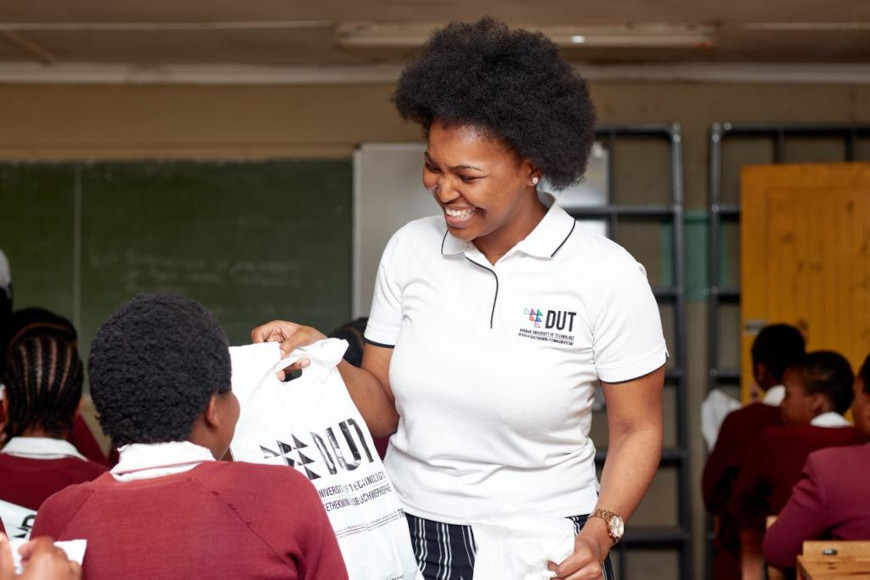A Durban University of Technology (DUT) staff member from the Financial Aid Department, Letsebela Morai, supported by the DUT Hands of Compassion Programme and the DUT Engagement Office under the Deputy Vice-Chancellor: Research Innovation and Engagement recently hosted the PadAGirl Drive for secondary school learners at Kwantebeni Comprehensive High School at KwaNyusa, KwaZulu-Natal.
The PadAGirl Drive strives to provide sanitary pads to adolescent girls and young women in underprivileged communities. Morai believes in giving back to the community and uplifting others since she is a philanthropist by nature. She normally launches community outreach programmes whenever she sees a need or a gap. The PadAGirl drive stemmed from observing the challenges faced by women in rural areas.
For now, her target is high schools in rural areas since 80% of people in rural areas live in abject poverty and stores are not easily accessible. Most students are unaware of the importance of menstrual hygiene or how to calculate their period cycle, thus this drive also aims to educate them. With this drive she wants a school girl on her periods to be stress free and only worry about her academic excellence. She recently went to Kwantebeni Comprehensive High School at KwaNyuswa to donate the pads that were collected from the DUT community.
Due to not having enough funds, Morai does not have offices to operate from, for now, that is why she only hosts the PadAGirl Drive for only two months a year, May, and August. Financial and transportation logistics are still hindering the growth of PadAGirl Drive.
“It has dawned to me that whether you are rich, poor, or middle class, you cannot run away from periods as a woman. It is a woman’s human nature. I wish to support young girls from disadvantaged backgrounds with sanitary pads, two packs per child can go a long way, and hence I initiated this to end period poverty” she explained.
The vision of the PadAGirl Drive is to cater for the disadvantaged or low-class females who cannot afford sanitary towels. She intends on bringing real solutions to end period poverty, by having resources and an inventive research and development staff that can explore and invent reusable sanitary towels. Instead of relying on sponsors, she wishes to have a firm where she can produce or manufacture pads which will ultimately create more job opportunities. She also wants this drive to expand and add other hygienic products such as basic cosmetics. Her greatest fulfilment would be seeing sanitary pads being distributed like free condoms.
She revealed that the DUT community has welcomed this drive with warm hands, they have contributed to the success of this project, since she managed to reach the target on the first drive. Morai specifically wanted to acknowledge the work of the DUT Libraries team, who worked tirelessly to coordinate and collect the sanitary pads; and the DUT Hands of Compassion Programme and DVC RIE Engagement Office, who also supported the initiative. Morai also extended a big thank you to the Somatology Clinic which went beyond by offering services in return for a sanitary pad pack, such as ‘Get a FREE Back, Neck & Shoulder massage or get 50% off full body massage when you bring a sanitary pack of pads’ and thanked the DUT staff at large. She is planning to bring relevant departments on board such as the Department of Social Development and partner with other stakeholders that might be interested in this initiative so that she can expand by providing food parcels to the less fortunate communities.
“At the moment I don’t have any, but I would really appreciate solid sponsors and donors. If you would love to sponsor our next outing or donate to this charity, please contact letsebella@gmail.com,” she said.
Pictured: Letsebela Morai
Nomvelo Zulu

